Looking for the best internal AI assistants in 2025? Here’s a quick rundown of top picks that can handle repetitive tasks, improve efficiency, and integrate into your workflows. From customer support automation to scheduling and task management, these tools save time and help teams focus on high-value work.
Key Highlights:
- Internal AI assistants streamline tasks like answering queries, scheduling, and managing workflows.
- They integrate with tools like CRMs, calendars, and help desks, making them part of your daily operations.
- Features, pricing, and use cases vary, so choosing the right one depends on your business needs.
Top 9 AI Assistants:
- Quidget: Focused on customer support and sales, handles 80% of routine queries, integrates with tools like Zendesk, and starts at $16/month.
- ChatGPT: A general-purpose assistant for content creation, research, and automation, with flexible pricing starting at $20/month.
- Gemini: Google Workspace’s AI assistant for email, docs, and presentations, included with Workspace subscriptions.
- Claude: Business automation tool for workflows, sales tasks, and customer support, with plans starting at $17/month.
- Motion: AI for task management and scheduling, starting at $8/month.
- Sunsama: Daily workflow organizer for individuals and teams, integrates with tools like Trello and Slack.
- Sintra AI: Offers specialized AI "team members" for roles like sales, customer support, and marketing.
- Reclaim: Smart calendar management tool for focus time, meetings, and habits, starting with a free plan.
- DeepSeek: Developer-focused assistant for coding, debugging, and documentation.
Quick Comparison Table:
| AI Assistant | Primary Use Case | Starting Price | Key Features |
|---|---|---|---|
| Quidget | Customer support & sales | $16/month | Handles 80% of queries, multilingual, multi-channel support |
| ChatGPT | General business tasks | $20/month | Content creation, research, API integration |
| Gemini | Google Workspace tasks | Included with Workspace | Deep integration with Gmail, Docs, Drive |
| Claude | Workflow automation | $17/month | Handles complex workflows, integrates with CRMs |
| Motion | Task scheduling | $8/month | AI task prioritization, custom workflows |
| Sunsama | Daily planning | Subscription-based | Unified task and calendar view |
| Sintra AI | Role-specific automation | Subscription-based | Pre-trained AI "team members" for specific tasks |
| Reclaim | Calendar optimization | Free plan available | Focus time, meeting scheduling, habit tracking |
| DeepSeek | Developer assistance | Flexible pricing | Code generation, debugging, documentation |
What to Watch For:
- Integration: Ensure compatibility with your existing tools (e.g., CRMs, calendars).
- Customization: Look for assistants that can learn from your data and workflows.
- Scalability: Choose tools that grow with your business needs.
- Pricing: Evaluate plans based on your usage and team size.
These AI assistants can transform how your team works, making operations smoother and more efficient. Start with free trials to find the best fit for your needs.
10 Best AI Assistants You Need to Work Smarter
What Are Internal AI Assistants and Why They Matter
Internal AI assistants are designed to streamline specific business operations like customer support, sales, and internal workflows. Unlike general-purpose AI tools, which cater to a wide range of tasks, these assistants are tailored to meet the unique needs of your business.
They handle tasks such as answering inquiries, scheduling meetings, processing routine requests, and managing data entry – saving time and resources.
How Internal AI Differs from General AI Tools
Here’s the key distinction: general AI tools, like ChatGPT, are built for broad conversational tasks. Internal AI assistants, on the other hand, are deeply integrated into your business processes. They adapt to your workflows and connect directly with critical systems like your CRM, help desk software, calendars, and databases.
This integration allows them to access customer data, update records, and even trigger workflows automatically. The result? A system that doesn’t just answer questions but acts as an extension of your team.
Core Benefits That Drive Business Results
Internal AI assistants offer several advantages that directly impact business performance:
- Automating Repetitive Tasks: They take over mundane, time-consuming tasks, freeing up your team for higher-value work.
- Faster Response Times: AI assistants retrieve information from multiple systems in seconds, cutting down on customer wait times and improving satisfaction.
- 24/7 Availability: They ensure your business can provide around-the-clock support without requiring additional staff, a huge plus for companies with global customers.
- Consistent Service Quality: Unlike human agents, AI assistants deliver the same high-quality service every time, without fatigue or lapses in attention.
These benefits make them indispensable for businesses looking to streamline operations and enhance customer experiences.
Real Business Applications
Internal AI assistants shine in practical, real-world scenarios:
- Customer Support: They handle tasks like resetting passwords, answering billing questions, tracking orders, and guiding users through troubleshooting. For more complex issues, they escalate cases to human agents seamlessly.
- Sales Support: From qualifying leads and answering product questions to scheduling demos and gathering contact info, AI assistants let sales teams focus on closing deals with high-value prospects.
- Internal Operations: Employees can use AI assistants to find company policies, submit IT tickets, request time off, or access training materials. These assistants act as a smart, searchable knowledge base that understands natural language queries.
The Strategic Advantage
By adopting internal AI assistants, businesses can achieve faster response times, better customer retention, and a sharper competitive edge. Sales teams spend more time nurturing promising leads, while customers enjoy quicker, more consistent service. Over time, these improvements reduce negative feedback and foster loyalty.
Choosing the right AI assistant is critical. Modern systems are designed to understand context, retain interaction history, and adapt to your workflows – all while being easy to manage. The right choice can transform your operations and help you stay ahead in an increasingly competitive market.
1. Quidget – AI Agent Builder for Customer Support & Sales
Quidget is all about improving real customer interactions. Created by SupportYourApp, a company with over 14 years of experience in customer support, this platform combines proven AI automation with practical expertise.
Quidget enables businesses to build AI agents that can handle up to 80% of routine customer inquiries, leaving human agents free to tackle more complex issues. This hybrid approach ensures customers receive quick answers while still having access to real people when it matters most.
Primary Use Case
Quidget is designed for customer support, sales automation, and onboarding workflows. Its AI agents are trained using your business data, FAQs, and workflows, allowing them to efficiently manage repetitive questions about pricing, features, accounts, or orders by pulling answers directly from your knowledge base.
For sales teams, Quidget does the heavy lifting by qualifying leads, answering product-related questions, and even scheduling demos. This allows sales representatives to focus on high-value prospects instead of repeatedly answering the same basic queries.
A mid-sized e-commerce business using Quidget reported a 40% decrease in response times and a 25% boost in completed sales thanks to AI-driven product recommendations and instant customer support.
Quidget also offers diverse integration options to fit seamlessly into your existing operations.
Integration Options
Quidget integrates effortlessly with popular tools like Zendesk, Calendly, and various CRMs. It also provides API access, enabling custom integrations that connect AI agents to your workflows and data sources.
Its multi-channel deployment ensures consistent support across platforms like websites, mobile apps, WhatsApp, Slack, Telegram, and Viber. This means customers can reach out through their preferred communication channels without losing quality or consistency.
A standout feature is Quidget’s web crawler, which automatically trains AI agents using the content on your website. This eliminates the need for manual data entry. Additionally, you can upload documents, FAQs, and knowledge base articles to create a well-rounded AI response system.
Customization Features
Quidget offers robust customization options to match your brand’s identity. You can tweak chat widget colors, fonts, and behavior to provide a seamless customer experience.
Pre-built templates for support, sales, and lead generation make setup quick and easy. These templates are fully customizable, allowing businesses to tailor workflows like support ticket routing or lead qualification to their specific needs.
The platform supports 45+ languages, making it a great fit for businesses with customers around the globe. AI agents can even switch languages automatically based on customer preferences, ensuring smooth interactions for everyone.
Quidget’s flexibility doesn’t stop there – it’s built to grow with your business.
Scalability & Pricing
Quidget offers four pricing plans to accommodate businesses of all sizes:
- Starter: $16/month for 500 AI responses and 1 chatbot
- Pro: $79/month for 10,000 responses and 5 chatbots
- Pro Plus: $210/month for 50,000 responses and 50 chatbots
- Enterprise: $599/month with custom limits and dedicated support
Each plan includes a 7-day free trial – no credit card required. Opting for annual billing can save you up to 20%, and you’re free to upgrade, downgrade, or cancel anytime without being locked into a contract.
The pricing is based on AI responses rather than user seats, making it cost-effective for businesses managing high volumes of customer interactions. Larger organizations can benefit from the Enterprise plan, which includes white-labeling, custom integrations, and dedicated account management for a tailored experience.
2. ChatGPT – A Versatile AI Assistant for Business Workflows
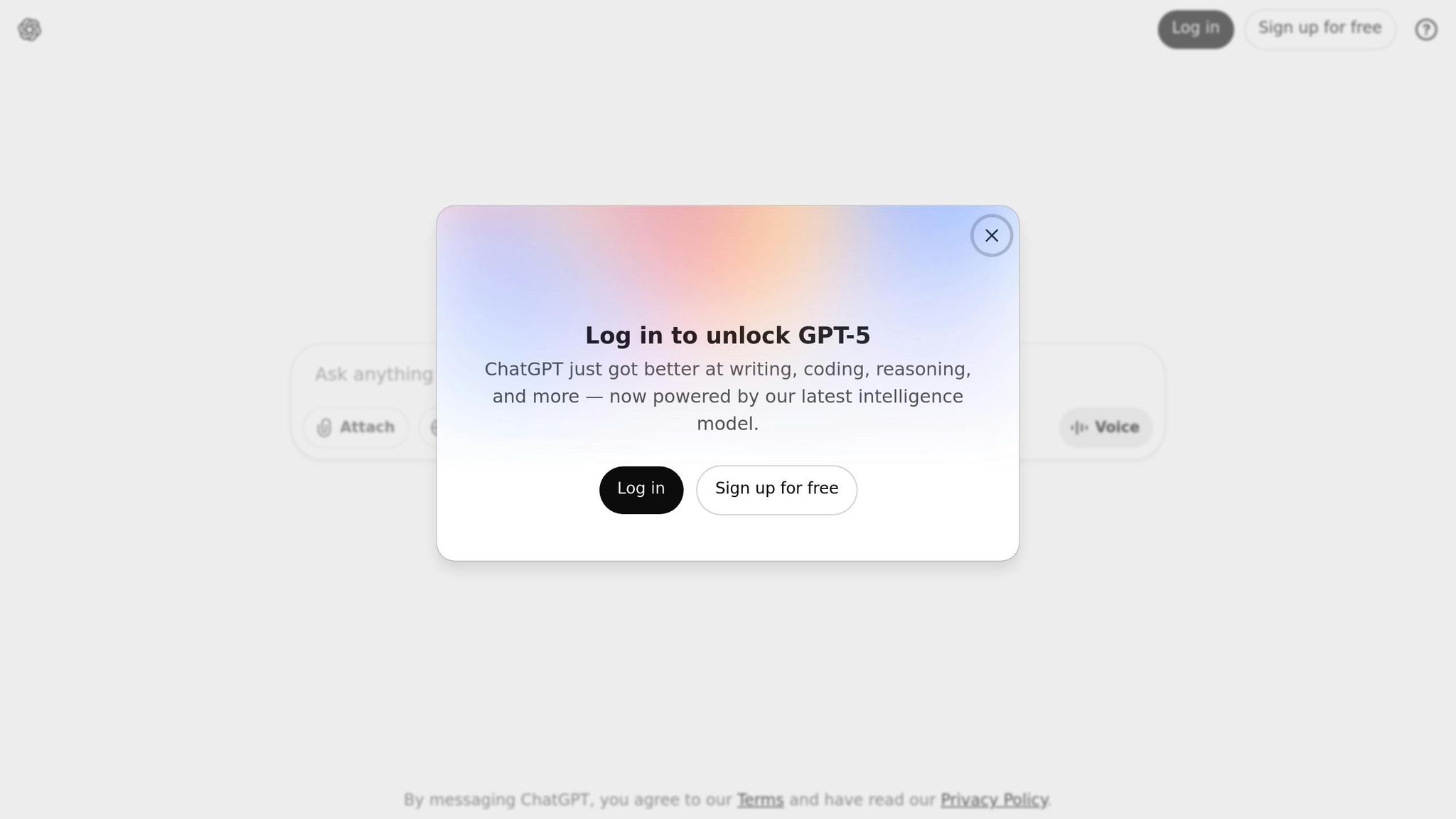
Among the growing roster of AI tools, ChatGPT stands out for its broad range of applications and user-friendly design. Developed by OpenAI, ChatGPT is a flexible AI assistant that businesses use for tasks ranging from content creation to data analysis.
Unlike niche tools designed for specific tasks, ChatGPT adapts to diverse business needs. Whether it’s drafting emails, creating presentations, brainstorming marketing campaigns, or analyzing data, its conversational interface makes it accessible to employees across various departments.
Primary Use Case
ChatGPT shines in areas like content creation, research, and automating workflows. For example:
- Marketing teams use it to craft blog posts and social media content.
- HR departments rely on it for writing job descriptions and developing training materials.
- Sales teams benefit from personalized outreach messages and proposal drafts.
- Development teams use it for reviewing code and preparing technical documentation.
Its flexibility is further enhanced by its ability to integrate seamlessly with existing tools.
Integration Options
ChatGPT supports integration through APIs and third-party connectors, making it easy to embed into existing workflows. Popular platforms like Zapier, Make.com, Slack, Microsoft Teams, Google Workspace, and Salesforce allow businesses to incorporate ChatGPT’s functions directly into their daily operations. Additionally, the mobile app offers voice command functionality, making it a handy tool for users on the go.
These integration options allow businesses to create customized solutions tailored to their specific needs.
Customization Features
For businesses looking to fine-tune ChatGPT’s capabilities, the GPT Builder provides an option to train custom GPTs using internal documents and guidelines. Features like role-based prompting and pre-written response libraries ensure outputs are aligned with business objectives. Conversation memory further enhances its utility by supporting ongoing projects without requiring repeated context setup.
Scalability & Pricing
ChatGPT offers flexible pricing to suit various business sizes and needs.
- The Plus plan costs $20 per user per month and includes GPT-4 access, faster response times, and priority service.
- For API users, pricing starts at $0.0015 per 1,000 input tokens and $0.002 per 1,000 output tokens for GPT-3.5 Turbo. GPT-4 pricing ranges from $0.03 to $0.06 per 1,000 tokens.
- Enterprise plans include advanced security features and dedicated support, with pricing tailored to specific requirements.
This combination of adaptability, integration options, and scalable pricing makes ChatGPT a valuable tool for businesses aiming to streamline their workflows and improve efficiency.
3. Gemini – Multimodal Assistant with Deep Integration into Google Workspace
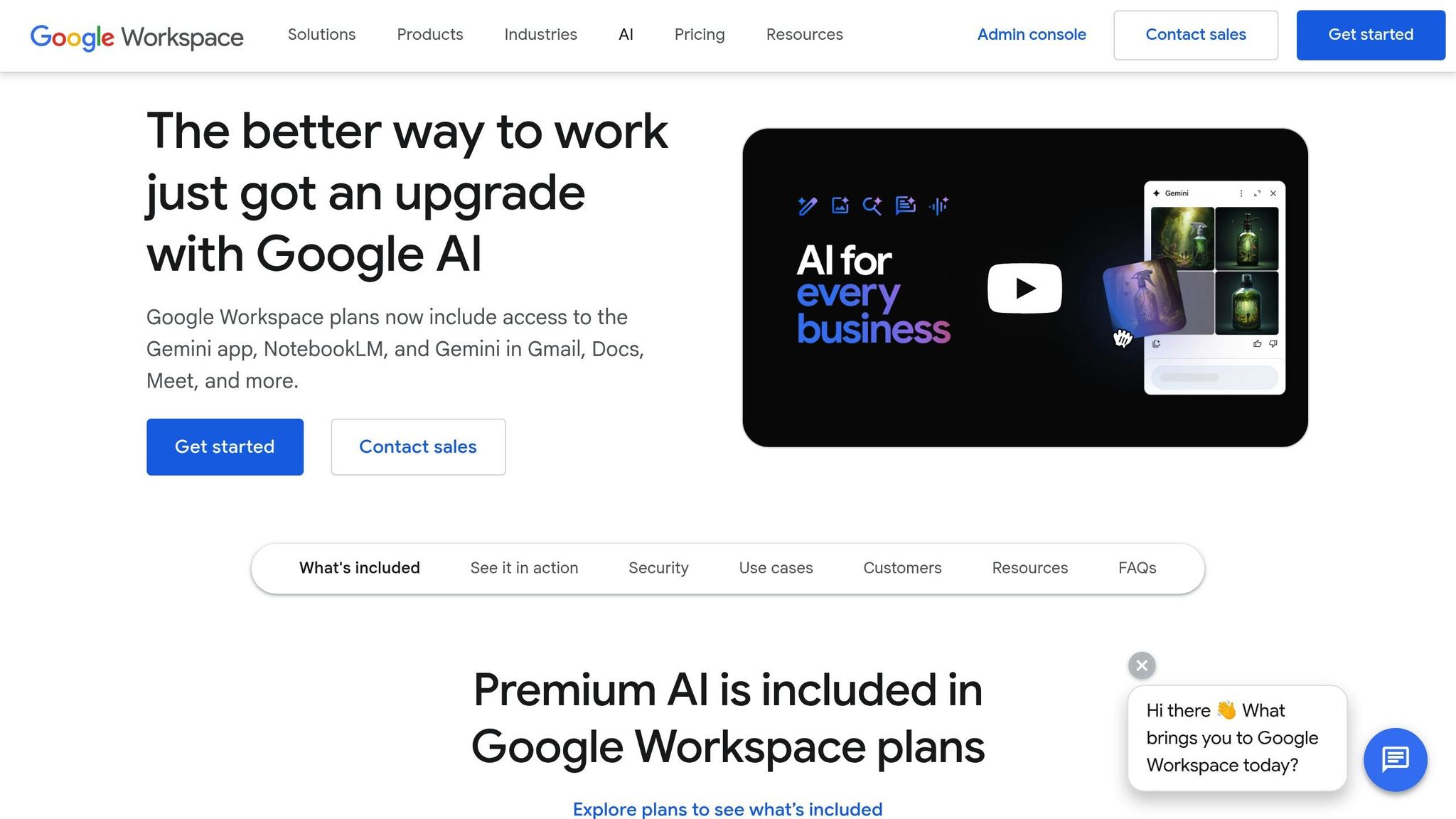
Gemini is Google’s AI-powered assistant, tailored for businesses that depend on Google Workspace. This versatile tool works across text, images, documents, and even voice inputs, embedding AI capabilities directly into the tools many already use daily. This deep integration makes Gemini a standout in the world of internal AI assistants.
Primary Use Case
Gemini shines within Google Workspace by streamlining tasks like document analysis, content drafting, and email management. It can sift through lengthy files, pull out the key takeaways, and even propose ideas for presentations – all without requiring users to jump between platforms.
Integration Options
A major strength of Gemini is how effortlessly it blends into Google Workspace. It works hand-in-hand with core apps like Gmail, Google Docs, Sheets, and Drive. Plus, it supports voice commands and functions smoothly across multiple devices, adding flexibility for users on the go.
Customization Features
Gemini can be tailored to fit your business needs. By learning from custom templates and past interactions, it aligns with your internal terminology and style guidelines, ensuring consistent communication and project management.
Scalability & Pricing
Gemini is included with current Google Workspace subscriptions. Details about advanced features and enterprise-level pricing are expected to be shared soon.
4. Claude – AI Assistant for Safe Business Automation

Claude, developed by Anthropic, is a cutting-edge AI assistant designed to bring safe, accurate, and secure automation to businesses. Unlike traditional tools that rely on simple conditional logic, Claude introduces intelligent decision-making to streamline complex workflows, offering far more than basic task execution.
Primary Use Case
Claude shines in intelligent automation, enabling AI agents to grasp business context, coordinate across tools, and adapt strategies based on real-time data. This makes it particularly effective for tasks like sales automation, customer support, and managing intricate workflows. The goal? To free up teams for more strategic, high-value work.
The numbers back it up. Lindy, an automation platform powered by Claude Sonnet 3.5, experienced 10x customer growth and 3-5x productivity increases in customer workflows. Even more impressive, it automated 70% of routine support tickets, allowing teams to focus on more complex challenges.
For sales teams, Claude-powered agents handle tasks like lead research, crafting personalized outreach emails, and qualifying prospects based on tailored criteria. One SaaS startup leveraging Claude through Lindy now books 40+ meetings each month, letting their sales team concentrate on meaningful conversations instead of initial outreach.
Integration Options
Claude integrates seamlessly with over 5,000 apps through platforms like Lindy. It connects to CRMs, project management tools, email systems, and calendars via APIs, making it highly versatile.
With 100+ pre-built templates for sales, support, and operations, Claude simplifies automation setup. Users can create complex workflows using natural language instructions, eliminating the need for coding expertise.
Customization Features
What truly sets Claude apart is its ability to understand nuanced business needs and make smart decisions. For example, a task like lead qualification, which used to take three hours of manual research per prospect, can now be completed in minutes – with greater precision.
Claude-powered agents operate autonomously 24/7 but still allow teams to retain control over strategic decisions. The system adapts to new information and adjusts workflows dynamically, ensuring smooth operation even when unexpected scenarios arise.
Scalability & Pricing
Claude offers flexible pricing plans to suit different needs:
- Free Plan: $0/month – Includes web and mobile chat, code generation, content creation, and text/image analysis.
- Pro Plan: $17/month (billed annually) – Adds unlimited projects, Google Workspace integration, enhanced processing capabilities, and access to multiple Claude models.
- Max Plan: Starting at $100/month – Offers 5x to 20x more usage than the Pro Plan, higher output limits, and early access to advanced features.
For businesses adopting Claude-powered automation, the results are striking. Sales teams see a 72% reduction in time-to-qualified-lead, while support teams are freed up to tackle complex issues instead of routine ticket handling.
5. Motion – Task Management and Scheduling AI Assistant
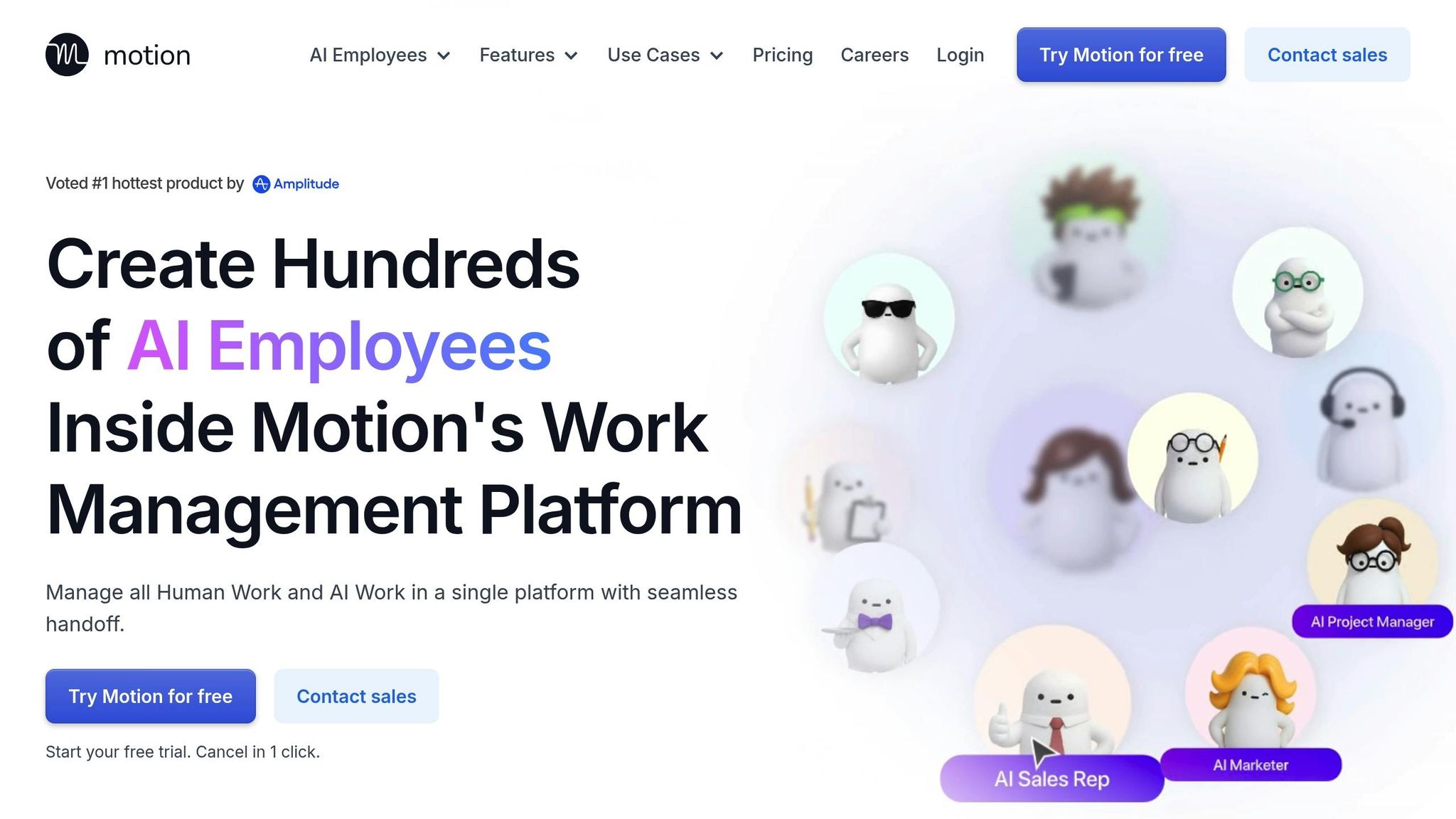
Motion is an AI-powered assistant designed to streamline task management and scheduling by automatically organizing work based on priorities, deadlines, and team capacity.
Primary Use Case
Motion takes task management to the next level with its advanced scheduling capabilities. It automates project management by using your team’s standard operating procedures (SOPs) and its AI Workflows Builder to create fully fleshed-out projects. With just a simple text prompt or an uploaded file, Motion generates tasks, assigns deadlines, and allocates responsibilities.
All you need to do is describe your project, and Motion will create a project plan tailored to your team’s workflow.
Additionally, Motion’s Custom AI Employees allow you to build specialized virtual assistants. These assistants can be personalized with existing data, including projects, tasks, meetings, and notes, making them highly adaptable to your team’s needs.
Integration Options
Motion provides reusable project templates that can be customized to suit your team. These include AI-generated templates that adjust to specific operational requirements, ensuring a smoother workflow.
Customization Features
Motion gives users detailed control over task parameters such as deadlines, priorities, durations, and dependencies. By analyzing multiple data points, it schedules tasks efficiently.
Teams can fine-tune work hours, task categories, and more. Its visual layout is particularly helpful for creative workflows, such as mapping out design timelines, managing client revisions, and coordinating team collaborations. Features like recurring tasks, custom time windows for task completion, and preferred meeting slots (with limits on daily meetings) provide additional flexibility.
One of Motion’s standout features is its ability to adjust tasks and schedules in real time. As priorities shift, the system automatically updates assignments and timelines to keep everything on track.
User Feedback
While Motion offers a wealth of features, some users have found the initial setup process a bit demanding. Inputting details like task durations and project affiliations can take time. Additionally, although the platform provides extensive customization, a few users have expressed a desire for greater manual control over the AI’s scheduling decisions, especially when managing more complex workflows. Despite these challenges, Motion remains a powerful tool for teams looking to optimize their task and project management.
6. Sunsama – Personal Workflow and Team Organizer

Sunsama is a tool designed to help individuals and teams manage their daily tasks and schedules more effectively. Instead of overwhelming users with endless to-do lists, it encourages planning around what’s realistically achievable in a day.
Primary Use Case
Sunsama is all about simplifying daily workflow planning. It pulls together calendar events and tasks from popular management tools, giving users a clear and consolidated view of their priorities. This makes it easier to focus on what truly matters. Teams can also collaborate by sharing daily priorities, ensuring everyone stays aligned and avoids taking on more than they can handle.
Integration and Customization Features
Sunsama works seamlessly with tools like Asana, Trello, Notion, GitHub, Gmail, Slack, and calendar apps such as Google Calendar, Outlook, and Apple Calendar. This integration brings tasks and meetings into one unified view. It also offers features like customizable planning sessions, scheduling templates, and reflection tools to help users evaluate their progress and fine-tune future plans. These options make Sunsama adaptable to varying needs.
Scalability & Pricing
Sunsama offers a subscription-based model with a free trial for new users. Its pricing is straightforward, catering to both individuals and teams. Shared workspace views make it easy to coordinate schedules, even when team members are spread across different time zones.
sbb-itb-58cc2bf
7. Sintra AI – Automation for Internal Team Roles

Sintra AI takes a unique approach to internal automation by offering specialized AI "team members" tailored for specific business roles. Instead of a one-size-fits-all assistant, Sintra AI provides dedicated AI helpers like Vizzy (virtual assistant), Milli (sales manager), and Cassie (customer support specialist), each designed to handle a particular set of tasks.
These AI team members come pre-trained for their roles. For example, Vizzy organizes calendars and schedules meetings, Milli creates cold call scripts and persuasive sales emails, and Buddy, the business development manager, focuses on growth strategies and competitor analysis to help businesses expand.
Primary Use Case
Sintra AI streamlines workflows by replacing traditional processes with eleven specialized AI team members, each designed for a specific internal role.
- Cassie, the customer support specialist, manages emails, live chats, and FAQs while maintaining your brand’s tone. She can even craft product manuals and provide 24/7 assistance.
- Dexter, the data analyst, simplifies complex data, delivering actionable insights and forecasts to support informed decision-making without the need for a dedicated analytics team.
- Commet, for eCommerce, assists with setting up online stores and writing product descriptions.
- Emmie handles email marketing, creating campaigns and win-back flows to turn subscribers into paying customers.
- For content needs, Penn writes ad copy and blog posts, while Seomi develops SEO strategies to improve website rankings.
Integration Options
Sintra AI integrates seamlessly with tools like Google Calendar, Gmail, and Notion, making it easier to manage workflows. It also connects with CRM systems and marketing automation platforms, allowing AI helpers to access customer data and campaign information. For instance, Cassie can pull customer history to respond to support tickets, while Milli can access sales pipeline data for follow-ups.
By integrating with platforms like ChatGPT, Blaze, and LinkedIn, Sintra AI eliminates the need for juggling multiple tools, streamlining operations.
Customization Features
Sintra AI adapts to your business by learning from your brand guidelines, files, and website content to ensure it aligns with your company’s tone. It also offers specialized workflows, such as:
- "Ghostwriter Mode" for crafting email sequences
- "SOP Builder" to train virtual assistants
- "AI Deck Builder" for creating pitch presentations
- "Lead Magnet Helper" to transform long-form content into downloadable resources
The platform continuously learns and evolves based on interactions, becoming more effective over time.
Scalability & Pricing
Sintra AI operates on a subscription model that adjusts to your team’s size and needs. Whether you’re a small startup looking for basic automation or a larger company requiring multiple AI specialists, Sintra AI scales with you. You can add AI helpers as needed, paying only for the roles you use, making it a flexible and cost-efficient solution for automating tasks without overhauling your entire workflow system.
8. Reclaim – Smart Scheduling and Calendar Management
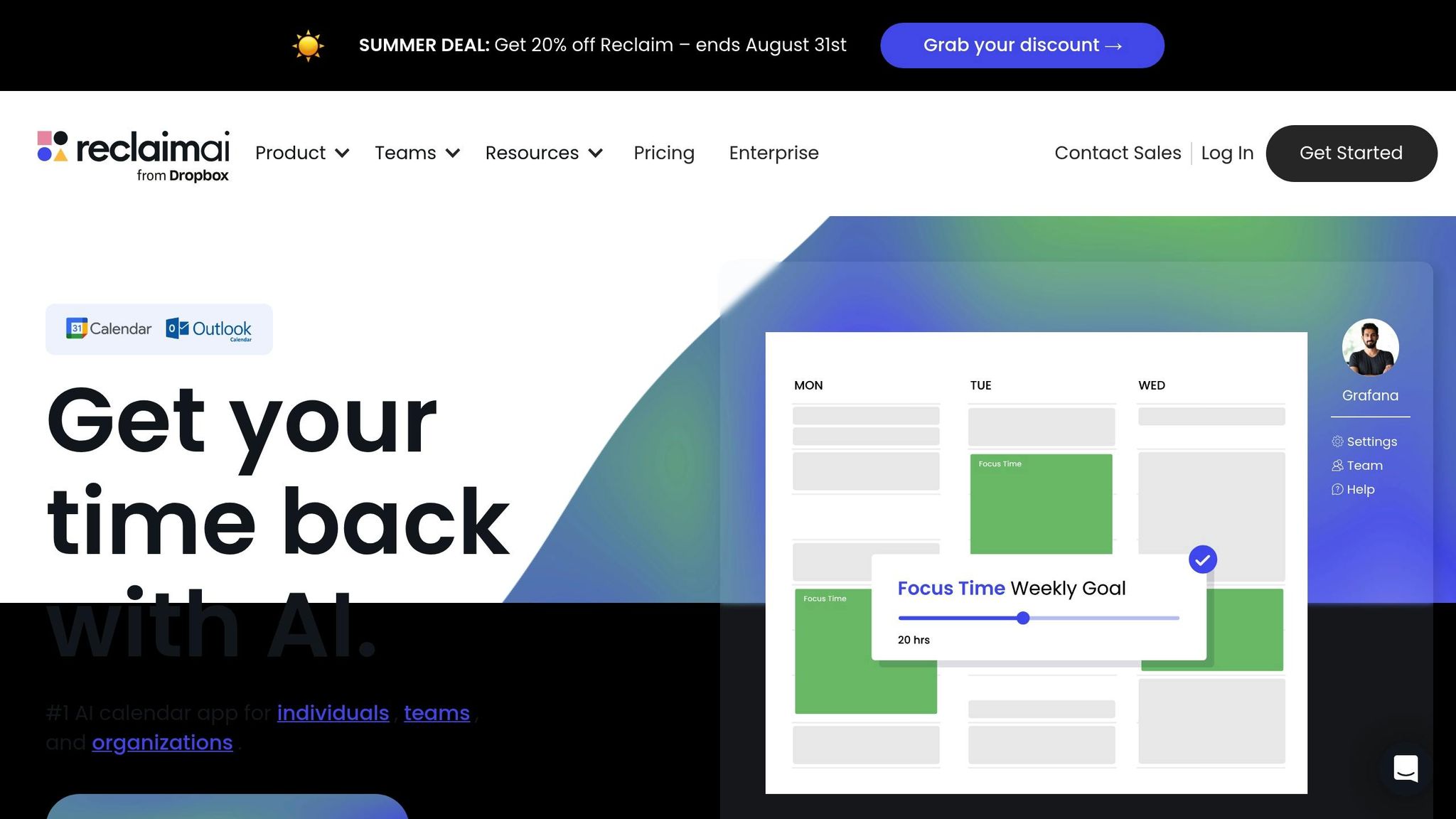
Reclaim is an AI-powered assistant designed to streamline calendar management and optimize your time. It automatically blocks focus time, schedules meetings intelligently, and helps balance work priorities. By analyzing your calendar habits, it creates a tailored scheduling system that adapts to your needs.
Primary Use Case
Reclaim acts as your AI personal assistant for managing time, focusing on three main areas: protecting focus time, smart meeting scheduling, and habit tracking.
The tool identifies open slots in your calendar and reserves them for deep work sessions. If a meeting gets canceled or rescheduled, Reclaim quickly adjusts your focus blocks and meeting times to make the most of the newly available time. This avoids the frustration of scattered, unproductive gaps in your day.
For meetings, Reclaim integrates with your calendar to suggest the best times based on everyone’s availability and energy levels. It prioritizes scheduling high-demand tasks during your peak productivity hours and reserves less demanding activities for times when your energy dips.
The habit tracking feature ensures consistency in your routines by scheduling recurring activities like workouts, skill-building, or strategic planning. Reclaim treats these habits like flexible appointments, ensuring they’re always included in your schedule without disrupting other priorities.
These features work seamlessly with your existing tools, making it easier to stay organized and productive.
Integration Options
Reclaim’s smart scheduling syncs effortlessly with popular platforms to keep your calendar up-to-date. It connects directly with Google Calendar and Outlook, ensuring real-time updates for accuracy. Additionally, it integrates with project management tools like Asana, Trello, and Linear, automatically scheduling time to tackle tasks and projects.
For team collaboration, Reclaim integrates with Slack, providing scheduling updates and meeting reminders directly within your messaging app. Its Zoom integration ensures video links are added to meetings automatically and can even recommend meeting lengths based on the agenda and number of participants.
For companies with unique workflows, Reclaim offers API access, enabling custom integrations. This allows businesses to schedule specific activities, like code reviews or client calls, directly into their calendars.
Customization Features
Reclaim is highly adaptable to your work style, offering a range of customization options. You can define productivity preferences, such as your peak working hours, the types of tasks that need longer focus periods, and how much buffer time you prefer between meetings.
The platform enforces your scheduling rules automatically. For instance, you can set guidelines like "no meetings before 10 AM on Mondays" or "leave a 15-minute gap between consecutive calls." These preferences are applied when the AI suggests meeting times to others.
You can also customize focus time based on the type of work. For example, you might allocate 2-hour blocks for strategic planning, 45-minute sessions for email, and 90-minute slots for creative tasks. Reclaim learns your preferences and schedules accordingly, ensuring uninterrupted time for your most important work.
Scalability & Pricing
Reclaim is designed to scale with your needs, whether you’re an individual user or part of a large team. It offers a freemium model, starting at $0 per month. The free plan includes basic calendar optimization and focus time management, making it ideal for individuals looking to improve their time management at no cost.
Paid plans begin at $8 per user per month, unlocking advanced features like team scheduling, unlimited habit tracking, and priority support. For larger organizations, enterprise pricing is available, offering custom integrations, advanced analytics, and dedicated account management.
Whether you’re managing your own schedule or coordinating across a global team, Reclaim grows with you. The AI becomes increasingly effective as your organization expands, helping to prevent scheduling conflicts and ensure smooth operations across multiple time zones.
9. DeepSeek – A Developer’s Internal Assistant for Code-Centric Tasks
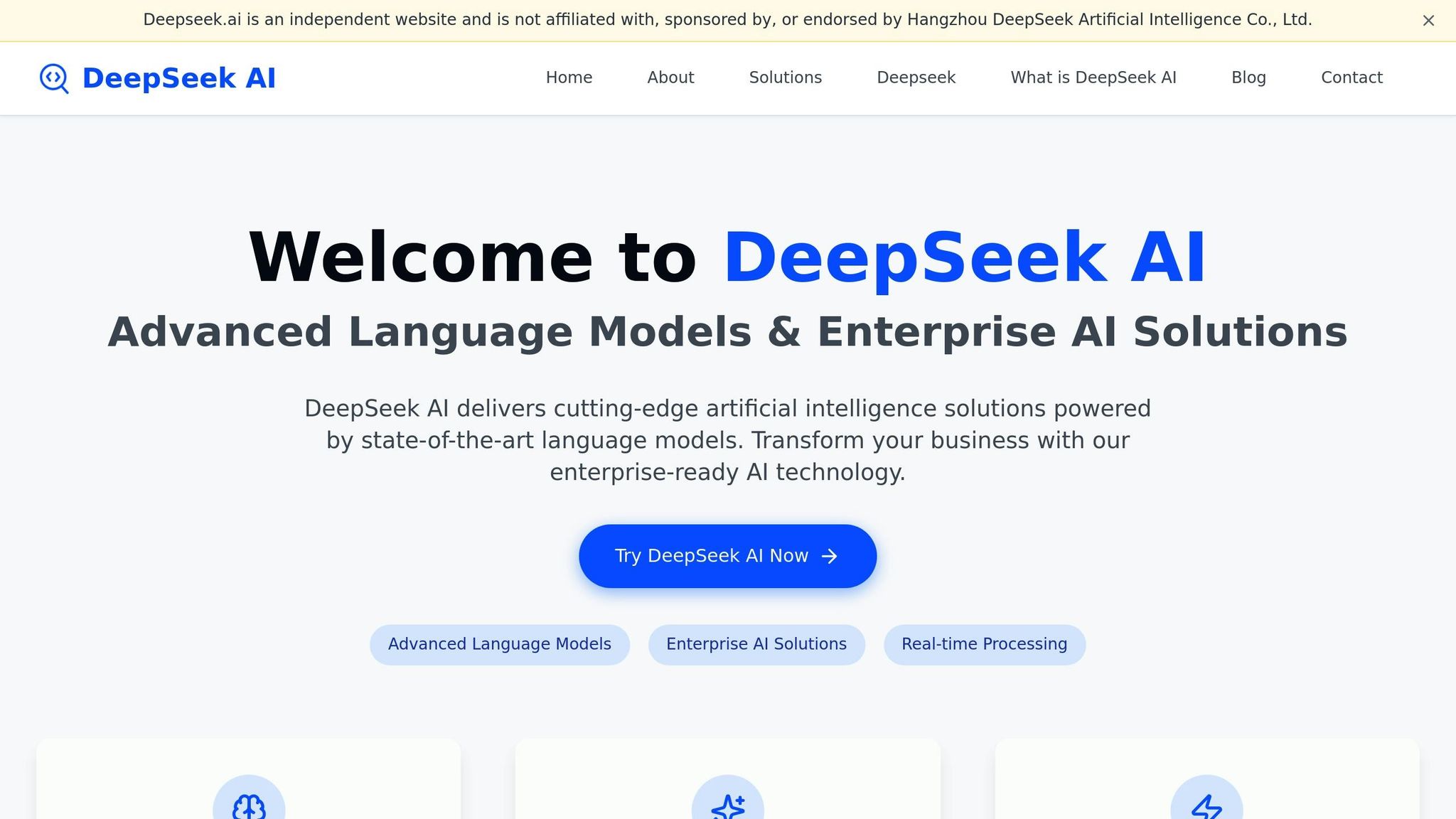
DeepSeek is a tool designed to make life easier for software developers. It helps with everything from turning natural language into code to spotting bugs and creating technical documentation.
What It Offers
Here’s what DeepSeek brings to the table:
- Code Generation: Converts natural language instructions into functional code.
- Debugging: Analyzes your code for logical errors and offers suggestions for fixes.
- Documentation: Automatically generates clear and concise descriptions for code functions and APIs.
Seamless Integration
DeepSeek doesn’t just work on its own – it integrates smoothly with widely-used development environments and version control systems. This means it fits right into your existing workflow without any hassle.
Tailored to Your Needs
You can configure DeepSeek to align with your specific coding standards. It even allows for custom templates and guidelines to ensure compliance with industry-specific security protocols.
Ready to Grow with You
Whether you’re a solo developer or part of a larger team, DeepSeek offers flexible pricing options. It’s built to handle increasing demands, so you can count on consistent performance as your projects expand.
Side-by-Side Comparison of Internal AI Assistants
Following the detailed reviews above, this comparison highlights the standout features and practical applications of various internal AI assistants. The right choice ultimately depends on your business goals, team size, and budget. Here’s a quick look at the key differences:
| AI Assistant | Primary Use Case | Overview |
|---|---|---|
| Quidget | Customer support & sales | A no-code AI agent builder that learns from your company data, supports live chat handoffs, works across websites, apps, messaging platforms, and supports over 45 languages. |
| ChatGPT | General business assistance | Known for its conversational abilities and content creation, it’s a versatile tool for various business needs. |
| Gemini | Google Workspace productivity | Designed to enhance workflows specifically within Google Workspace tools. |
| Claude | Business process automation | Focuses on automating workflows and providing reliable business-oriented responses. |
| Motion | Task and scheduling | Simplifies task management and scheduling with calendar-based features. |
| Sunsama | Workflow organization | Helps with daily planning and streamlining team workflows. |
| Sintra AI | Internal workflow automation | Tailored for automating internal processes by mimicking team roles. |
| Reclaim | Calendar management | Specializes in intelligent scheduling and calendar optimization. |
| DeepSeek | Developer assistance | Supports developers with tasks like debugging and code documentation. |
Customization and Training Capabilities
Quidget stands out with its ability to train on your company’s data, documents, and FAQs. It also allows you to adjust its appearance and tone to align with your brand. While other assistants offer customization options, they often require more technical expertise to fine-tune them for specific workflows.
Deployment and Channel Support
Quidget is versatile, operating seamlessly across websites, mobile apps, and platforms like WhatsApp, Slack, and Telegram. Other assistants may focus on web-based interfaces or require extra configuration to integrate with multiple channels.
Analytics and Performance Tracking
Quidget provides in-depth analytics on customer interactions, helping businesses identify strong performance areas and opportunities for improvement. While other platforms may include basic usage statistics, the depth and relevance of insights can differ significantly.
Scalability and Enterprise Features
Quidget is designed to grow with your business, supporting small teams as well as large-scale operations. It handles high interaction volumes and offers advanced features like white-labeling and custom integrations. Other assistants also cater to various business sizes, but their scalability and enterprise capabilities vary.
Security and Compliance
Quidget offers top-tier security and customizable compliance settings for managing sensitive customer data. Each platform approaches data protection differently, so it’s critical to evaluate their security measures carefully to ensure they meet your business requirements.
This comparison can guide you in aligning the tool’s features with your specific business needs and goals.
Common Mistakes When Choosing Internal AI Assistants
Selecting the right AI assistant for your business can be tricky, and mistakes in this process often lead to wasted time, money, and effort. These missteps can also frustrate teams and result in poor implementation. Let’s break down some common errors and how to avoid them.
Assuming All AI Assistants Are the Same
Mistake: Believing all AI assistants can handle the same tasks.
Each AI assistant is designed with a specific purpose in mind. For example, ChatGPT is great for content creation, Gemini integrates seamlessly with Google Workspace, DeepSeek specializes in debugging code, and Quidget excels at automating customer support. Trying to use a general-purpose AI for a specialized task – like using a scheduling tool such as Motion for customer service – is a recipe for inefficiency. Choosing the right tool for the job from the start saves time and ensures better results.
Believing AI Assistants Are Too Complex to Set Up
Mistake: Thinking that implementing AI requires extensive technical expertise or a lengthy setup process.
Many AI tools today are designed for quick and easy adoption. For instance, Quidget offers no-code configuration and integrates effortlessly with tools like Sunsama and Reclaim. It even trains itself on your existing data, eliminating the need for manual input. Businesses often overestimate the technical hurdles, when in reality, many AI solutions can be rolled out without needing a dedicated IT team.
Thinking AI Can’t Handle Sensitive Business Data
Mistake: Assuming AI assistants are unsafe for managing sensitive information.
Security concerns are valid, but modern AI tools like Claude and Quidget emphasize safety. Claude includes built-in safeguards for business automation, while Quidget offers enterprise-grade security with customizable compliance settings to handle sensitive customer data responsibly. Avoiding AI entirely due to security fears can leave businesses lagging behind competitors who adopt secure, well-designed solutions.
Focusing Only on Price Instead of ROI
Mistake: Opting for the cheapest AI tool without considering its long-term value.
A low-cost AI assistant, like Quidget’s $16/month Starter plan, can manage up to 500 customer inquiries, potentially cutting support tickets by 80% and freeing up human agents for more complex tasks. While free tools might seem appealing, they often require significant manual oversight, which could end up costing more in labor. Smart decision-makers evaluate the total cost of ownership, including setup, training, and maintenance, rather than focusing solely on the upfront price.
Expecting AI to Replace All Human Interaction
Mistake: Believing AI can fully replace human involvement.
The best strategies combine AI capabilities with human expertise. For example, Quidget uses a hybrid model where AI handles routine queries and seamlessly escalates more complex issues to human agents. Similarly, Sintra AI automates workflows but still relies on humans for strategic decisions. Businesses that aim to eliminate human interaction entirely risk frustrating customers and losing the benefits of empathy and creativity that only people can provide.
Ignoring Integration Requirements
Mistake: Overlooking how an AI assistant fits with your existing tools.
An AI assistant that doesn’t integrate with your CRM, calendar, or communication platforms can create inefficiencies and information silos. For example, Gemini is ideal for Google Workspace but may struggle in environments dominated by Microsoft tools. Before choosing an AI assistant, review your current software stack to ensure compatibility. Without proper integration, even the most advanced AI can fall short of its potential.
Conclusion
Choosing the right AI assistant comes down to how well it fits into your workflow and addresses your specific needs. Internal AI tools tailored to your operations can bring noticeable benefits, such as speeding up tasks by 40% and reducing routine workloads by 25%.
Once you’re aware of these advantages, the logical next step is to test the tools. Many AI assistants offer free trials or demo versions, giving you a chance to see how they perform in your day-to-day tasks. Whether your focus is on customer support, scheduling, coding, or team coordination, testing a tool that aligns with those workflows is key.
Take Quidget, for instance. It manages up to 80% of common inquiries, freeing up human agents to handle more complex issues. With pricing starting at $16 per month for 500 AI responses, it helps businesses save time while improving customer satisfaction through faster responses.
Avoid choosing an AI assistant solely based on its popularity. The best option will seamlessly integrate with your existing tools, solve your specific challenges, and grow alongside your business.
If you’re curious, you can try Quidget free for 7 days to see how it fits into your workflow.
FAQs
What makes internal AI assistants different from tools like ChatGPT, and why should businesses use them?
Internal AI Assistants: Tailored for Business Needs
Internal AI assistants are designed to address specific business functions, such as handling customer support, boosting sales, or simplifying employee onboarding. Unlike general-purpose tools like ChatGPT, which cater to a wide range of scenarios, these assistants are carefully customized to align with a company’s unique workflows, systems, and objectives.
The advantages are clear: context-aware and task-focused automation that enhances efficiency while delivering consistent and accurate responses. These assistants excel at managing repetitive tasks, improving customer interactions, and boosting team productivity – all while seamlessly fitting into a company’s existing processes.
What should businesses look for in an internal AI assistant to ensure it fits their workflows?
When selecting an internal AI assistant, businesses should prioritize how well it aligns with their existing tools and workflows. The goal is to ensure a seamless integration that doesn’t disrupt daily operations while meeting your specific needs.
Here are a few important aspects to evaluate:
- Scalability: Does the AI assistant have the capacity to grow alongside your business as your needs evolve?
- Security and compliance: Does it adhere to the regulatory requirements and standards of your industry?
- Ease of use: Is the interface intuitive enough for your team to adopt without extensive training?
Additionally, take a close look at the provider’s background. Their expertise can make a big difference, especially if the assistant offers features tailored to solving your unique challenges – like streamlining workflows or automating repetitive tasks. The right AI assistant can genuinely enhance efficiency while keeping things simple for your team.
How can businesses evaluate the ROI of using internal AI assistants like Quidget?
Businesses can assess the return on investment (ROI) of internal AI tools like Quidget by focusing on tangible results such as cost reductions, time savings, higher productivity, revenue gains, and better customer experiences.
To figure out ROI, compare the net benefits – like lower operational expenses or increased revenue – with the total cost of implementing the AI assistant. For instance, if the tool shortens customer support response times or automates repetitive tasks, the savings in both time and money can be quantified and factored into the ROI calculation.
Consistently monitoring these metrics over time helps businesses clearly understand the impact the AI assistant has on their operations.



